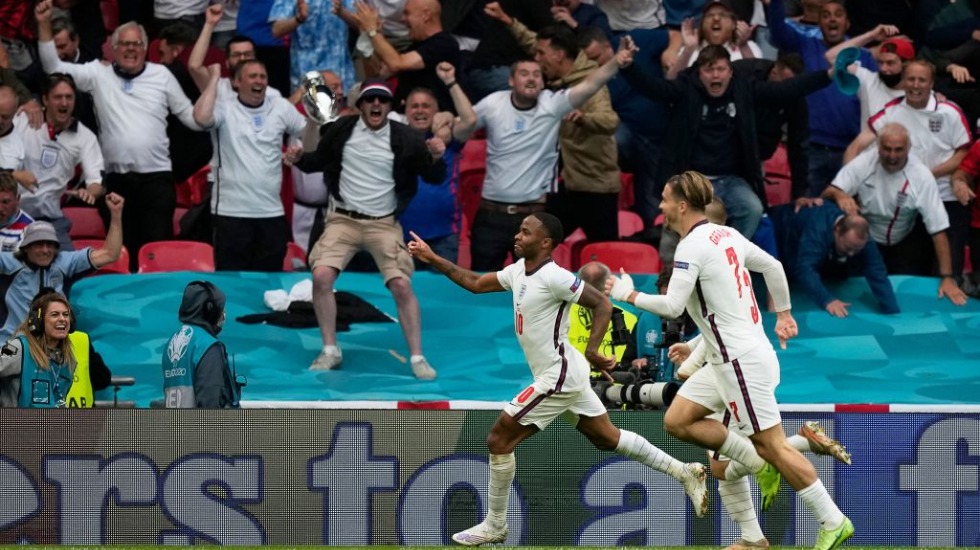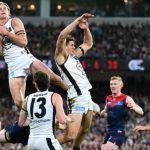The English faithful explode with delight after Raheem Stirling’s opening goal against Germany. Photo: GETTY IMAGES
It was Gary Lineker who famously quipped “football is a simple game; 22 men chase a ball for 90 minutes, and in the end, the Germans always win.”
It was a phrase that encapsulated England’s collective frustration at having been unable to defeat Germany at a major tournament since the 1966 World Cup Final.
So, perhaps it was understandable that the 2-0 win over “the old enemy” at the Euros was greeted with such wild euphoria back in my homeland. Every Englishman (and woman) who follows football can tell you exactly where they were when we lost to the Germans at major tournaments in our lifetimes. It’s ingrained into our national consciousness.
For once, the script didn’t play out as it normally does, and, being on the softer side of the draw, England now has a decent chance at progressing to a first major final since that famous day 55 years ago.
Yet for all the tub-thumping jingoism of the tabloids – and the raucous atmosphere at Wembley, which certainly helped get the Three Lions over the line – England’s relationship with its national team is not always a straightforward one.
In contrast to Australians, who largely rally around the flag quite instinctively, many English are much more at ease with their club allegiances. I include myself in this number. I’m a Manchester City fan first, English national team second. The socio-economic divide between north and south has a part to play in this, as does England’s propensity to play nearly all its matches at Wembley.
Getting to London (particularly in a pandemic), is not the easiest, nor cheapest, of tasks. Growing up in the north (as I did), watching England play live was not something I ever considered – it was too far, and too expensive, particularly as a midweek evening game would also involve an overnight stay if going by public transport.
Back in the early 2000’s, the old Wembley was knocked down and reconstructed. During that process, England was forced to take its home games to the regions, which many felt not only rebuilt the connection to a wider fan base, but also provided a much better atmosphere than the cavernous, if grandiose, home of the game.
Indeed, one wag on Twitter this week suggested that in order to give England a better chance against the Germans, it should inform them the game had been switched to Stoke. He had a point.
The belligerence of a section of England fans (egged on by the tabloids, it must be said), is also a turn-off, and not just for those who have suffered from their behaviour down the years.
The “two World Wars and one World Cup” brigade represent a version of Englishness that is an embarrassment to many of us. Particularly when, by and large, the Germans have been immaculate opponents in terms of their behaviour – and of course, have normally responded in the right way. On the field.
This was writ large when England hosted the Euros in 1996.
When England won through to a semi-final against the old foe, one tabloid stoked the fires by printing a front page headline that read “Achtung! Surrender! For you Fritz, ze Euro 96 Championship is over” – while simultaneously declaring “football war on Germany.”

The infamous Daily Mirror front page in 1996.
It was tacky stuff – and the backlash that followed led the paper in question to print an apology a day later.
The Germans? They simply did what they normally did. Beat us on penalties, won the tournament – and then paid for a full-page advert in another British newspaper to thank England for staging a great tournament. All class.
The UK was on the verge of change back then however, with Tony Blair’s New Labour administration just a year away, and all of its “Cool Britannia” connotations. Oasis, Blur, and the Spice Girls were leading the musical charge as the economy continued on a growth spurt that had started in 1993.
Euro ’96 was a harbinger of that transformation. The flag of St George largely replaced the divisive Union Jack as the emblem of English support, and covering the tournament (as I did for the BBC), the number of black, brown and female faces actively supporting England – perhaps for the first time – was noticeable.
Nick Hornby had written his seminal “Fever Pitch” just four years earlier, and the advent of the Premier League had made football “trendy” even among the traditionally lukewarm middle and upper classes.
There was a feeling of a “new” England beginning to develop. Still proud, but (tabloids aside), less bellicose, more European, more inclusive. Emerging into a different sense of self.
PLEASE HELP US CONTINUE TO THRIVE BY BECOMING AN OFFICIAL FOOTYOLOGY PATRON. JUST CLICK THIS LINK.
Twenty-five years on, and that England seems to have all but disappeared. Retreated back into its provincialism via a referendum on Brexit that split (and continues to split) the nation right down the middle, and exacerbated by the pandemic.
Gareth Southgate’s team has the unenviable task of trying to represent a fractured country. Evidence of the complexity of the challenge is his insistence on the team taking the knee to honour the Black Lives Matter campaign before games. The gesture has been booed and applauded in equal measure. A bit like Raheem Sterling – in himself another touchstone for the national mood, and not always for how he plays on the pitch.
Would an England Euros win heal the country? Unlikely. But this current incarnation of the England team offers some hope.
Southgate himself is a version of Englishness many of us would prefer the nation to be. Modest, undemonstrative, and a thinker, he is proud of his country – but not to the point of overt shows of perceived superiority.
He is aware of how unpalatable they can be. As the great writer on South American football, Tim Vickery, once remarked: “There is nothing so distasteful as another person’s nationalism.”
Southgate’s team have so far followed his lead, and his instructions to the letter. He has plotted a careful course through the Euros, switching tactics and personnel to suit the opposition. England hasn’t particularly excited, but its perceived achilles heel – a leaky defence – has been as watertight as a mermaid’s wetsuit.
Next up is Ukraine. As tempting as it might be to look ahead to bigger challenges, England must negotiate a potential banana skin in the last eight – and if it needs a warning from history, then it need look back no further than to the last Euros.
In 2016, England was red hot favourite to account for Iceland in the round of 16, but bowed out meekly to a country with a population less than Manchester. The fallout was brutal.
A Euros win would be a welcome tonic for a country still battling an identity crisis. In a post-colonial, post-Brexit world, where does England belong, and what does it stand for – especially if Scotland was to push through another referendum and vote to secede from the union?
England is – to the best of my knowledge – the only country at the Euros without its own parliament (Westminster is the British seat of government), and without its own national anthem (“God Save the Queen” is also a symbol of Britain).
Perhaps with all the confusion, it’s why the football team has taken on such meaning. It’s probably also why it has also become the heaviest shirt to wear.
If the Three Lions lift the trophy, then stand by for one of the biggest celebrations of all-time. If they fail, then Southgate and the players will face the modern-day equivalent of a spell in the Tower of London.
With England, it’s always all or nothing. Still, at least for once, we managed to beat the Germans.












